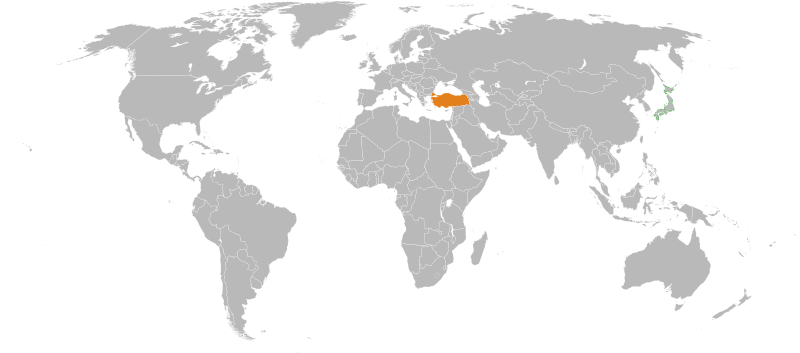
Country Name: Turkey
Geographical Area : 780,580 sq km
Population: 65,666,677 (July, 2000 est.)
Capital City: Ankara
People: Turkish, with minorities of Kurds, Greeks, and Arabs
Language: Turkish (official), Kurdish, Arabic English, French, and German are widely understood and spoken
Religion: Muslim, other
Government: Parliamentary republic
Head of Gov.: Prime Minister Tayyip Erdogan
Visas: Currently, Australian, Canadian, NZ and US citizens require a visa, but this is subject to change. Please check with the nearest Turkish Embassy or Consulate for the most up-to-date information concerning visas. Normally visas can be obtained as you enter the country for a fee of about US$ 20.
Health Risks: Heat exhaustion, dehydration, sunburn.
If you take a prescription medication, bring the current prescription note and a letter from your doctor with the medication’s name, manufacturer’s name, and dosage.
Clothing Suggestions: Turkey is a fairly large country, and its climate can vary from region to region. Here are some general clothing recommendations according to season.
SUMMER: April through October – casual clothing made of lightweight fabrics and good walking shoes are essential. A shawl, sweater and/or jacket is recommended for cooler evenings. Sunglasses and a sun hat are also recommended. Although shorts are appropriate casual attire for men, woman should avoid wearing them in cities.
WINTER: Mid-November through Mid-March – A wardrobe of matching coordinates, made of man-made fibers and/or wool, which allow for minimum and maximum warmth for varying temperatures is suggested. A topcoat with zip-out lining is also advised. It is wise to use the layered approach to clothing allowing for warmer or cooler weather spells.
SPRING/FALL: Mid-March through April and then October through Mid-November – Lightweight wool or topcoat are suggested.
DINING: Informal attire, except for some selected restaurants in main cities, which may require tie and jacket for men.
ARCHAEOLOGICAL SITES: Comfortable shoes and a sun hat are a must.
MOSQUES AND CHURCHES: Shorts are forbidden. Women are required to wear headscarves when visiting Mosques.
CRUISES: Casual daytime attire is suggested. For occasional special gala evenings cocktail cress and tie and jacket are suggested.
Time Zone: Two hours ahead of GMT/UTC; seven hours ahead of U.S. EST.
Banking / Exchange: Banks and post offices generally offer the best rates of exchange. It is best to avoid hotels and moneychangers that charge more than 5% commission.
Some western currencies, especially U.S. dollars, can be used to buy occasional goods and services; however, some Turks may take offense to this.
Currency: Turkish lira (YTL)
Electric Current: The standard household electrical current throughout Turkey is 220 AC, 50 cycles, and the outlets are made for two round poles. Adapters and transformers may be available in major hotels and cruise ships. Voltage is marked clearly on all hotel outlets.
Credit Cards / Traveler Checks: MasterCard and Visa are accepted in larger businesses; American Express and other credit cards are not as popular. It is possible to use most major credit cards to receive cash advances from banks and teller machines throughout the country.
TRAVELERS CHECKS:
While traveler’s checks are one of the safest means of carrying money, many businesses in Turkey do not accept them as payment, especially outside of large cities. It may be necessary to exchange them at banks or post offices.
Shopping
General Trade Stores Shopping Hours
Mon: 9 a.m. - 5 p.m. Thurs: 10 a.m. – 7 p.m.
Tues: 10 a.m. - 7 p.m. Fri: 10 a.m. – 7 p.m.
Wed: 9 a.m. - 5 p.m. Sat: 10:30 a.m. – 7 p.m.
Sun: Closed
Weights & measures:
Metric
1. Ask any merchant if he or she is authorized to issue Value Added Tax (VAT) refund invoice. If he or she is, ask for the invoice when you make your purchase.
2. When you leave Turkey, make sure your purchases and receipts are readily available for inspection. Allow plenty of time for this process when you arrive at the airport. A Customs official will stamp your invoice(s). Without this stamp, an invoice is not valid and VAT refund cannot be made.
3. Mail your invoice(s) back to the merchant(s) for a refund. Be sure to include your preferred method of reimbursement. You can receive a refund credited to a credit card or a bank account.
How to shop Tax Fee
1. Ask any merchant if he or she is authorized to issue Value Added Tax (VAT) refund invoice. If he or she is, ask for the invoice when you make your purchase.
2. When you leave Turkey, make sure your purchases and receipts are readily available for inspection. Allow plenty of time for this process when you arrive at the airport. A Customs official will stamp your invoice(s). Without this stamp, an invoice is not valid and VAT refund cannot be made.
3. Mail your invoice(s) back to the merchant(s) for a refund. Be sure to include your preferred method of reimbursement. You can receive a refund credited to a credit card or a bank account.
National Airport: Atatürk Havaalani (Istanbul)
Major Tourist Attractions: Ankara, Antalya, Bodrum, Cappadocia, Ephesus, Izmir, Istanbul, Kusadasi, Marmaris , Fethiye
Tipping Suggestion: Tips are generally not considered as a source of income, but they are usually expected. Generally, a 10% tip is appropriate in restaurants and taxis. Servers in many very high-class restaurants may expect a 15%-20% tip unless a service charge is included in the bill. If a service charge is included, leave a small tip to show your gratitude. A tip of about US AUS$ 2 is appropriate for hotel porters. For the Guides in our Escorted tours 4 dollar per person per day and 2 for driver is suggested .